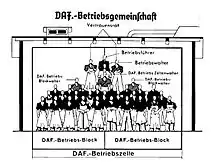
Betriebsführer in a German Labour Front organigram
Factory leader (German: Betriebsführer)[1] was a term introduced by the Labour organization law of 20 January 1934[2] for the owner, entrepreneur or manager of a business or company. Factory leaders and their “followers” (Gefolgschaft) formed the “factory community” (Betriebsgemeinschaft), replicating the national community (Volksgemeinschaft) in accordance with the leader principle (Führerprinzip). The term was also applied to owners and tenants of farms.[3]
See also
Notes
- ↑ Labour organization law, cited in: Tim Mason (1993): Social Policy in the Third Reich. The Working Class and the ‘national community’. Translated by John Broadwin, Berg: Oxford, New York, ISBN 0-85496-410-X, pp.103f.
- ↑ "Hours of work provisions under the national industrial recovery act 1934". labordoc.ilo.org. Retrieved 2017-06-08.
- ↑ Cornelia Schmitz-Berning (2000): Volkabular des Nationalsozialismus, s.v. Betriebsführer, Berlin:de Gruyter, ISBN 3-11-016888-X, pp.95f.
This article is issued from Wikipedia. The text is licensed under Creative Commons - Attribution - Sharealike. Additional terms may apply for the media files.